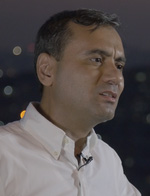
Ahmet Yayla
Ahmet Yayla says that to defeat terrorists, you have to think like a terrorist.
He tells his criminology students that they need to know the history of the culture and the motives of the organization. They need to understand the terrorists by reading their literature and viewing their videos.
Which is what Yayla, a counterterrorism scholar and a professor at George Mason University, was doing in March when he came across a disturbing video on Telegram, an app popular with ISIS members.
The short, stark video opens with a shot of a note written in Arabic and English proclaiming, “We are still here.” An ominous chant in Arabic promises deadly violence.
The video camera then tilts up to reveal the bustling Antwerp Central train station in Belgium.
It was the same chant, the same style of video and posted to the same video channel that preceded an attack in Istanbul that killed 39 people and wounded 70 at the Reina Nightclub.
Yayla, who was chief of counterterrorism for Turkish police forces in Ankara and Sanliurfa for 20 years, said he knew the video was no hoax—“these guys don’t fool around,” he said—and contacted Belgian authorities who sprang into action.
Arrests were made involving two terrorist cells, and several planned ISIS operations were disrupted, according to European reports. Yayla said his effort “saved time for police to look for [the terrorists]. We definitely saved lives.”
In addition to monitoring terrorist activity posted to social media, Yayla’s specialty is interviewing ISIS defectors. His latest book (with Anne Speckhard) is called “ISIS Defectors: Inside Stories of the Terrorist Caliphate.”
Two years ago he was a professor and the chair of the Sociology Department at Harran University in the Turkish city of Sanliurfa, near the Syrian border. Then ISIS leaders learned Yayla was working with defectors. “I had to leave the country right away,” he said. “It was a very risky business.”
He moved his family to safety in the Washington, D.C., area and eventually met David B. Wilson, chairman of George Mason’s Criminology, Law and Society Department who invited him to teach at Mason.
Yayla, Wilson said, “brings a unique blend of expertise and experience into the classroom for Mason students.
“In addition to his academic training in criminal justice and information science, he has extensive practical experience in fighting terrorism through his role chief of Counterterrorism and Operations Division for the Turkish National Police.”
Yayla says his teaching style is different from what some students might be accustomed to.
“I show them real-life videos from ISIS. I use ISIS materials to teach. We discuss what’s in those writings, examine what they’re advertising and we study attacks on the world.”
He focuses on current threats as well.
“I tell students, if you want to deal with the problem, you need to understand it. Without understanding it, you cannot cure it, you cannot find solutions to it…It’s a mind game.”
Kristen Hahn, a junior criminology major from Eldred, Penn., appreciates the experience that Yayla brings to the classroom.
“He helps us break down aspects of these clips and articles that show the ideologies of the groups, as well as their structure and tactics,” said Hahn, who is minoring in intelligence analysis and Arabic. “He then gives us the counterterrorism aspect on how to work against these groups.”
“In counterterrorism,” Yayla said, “the most important thing is not catching the bad guys. The most important thing is preventing attacks and saving lives of innocent people.”
